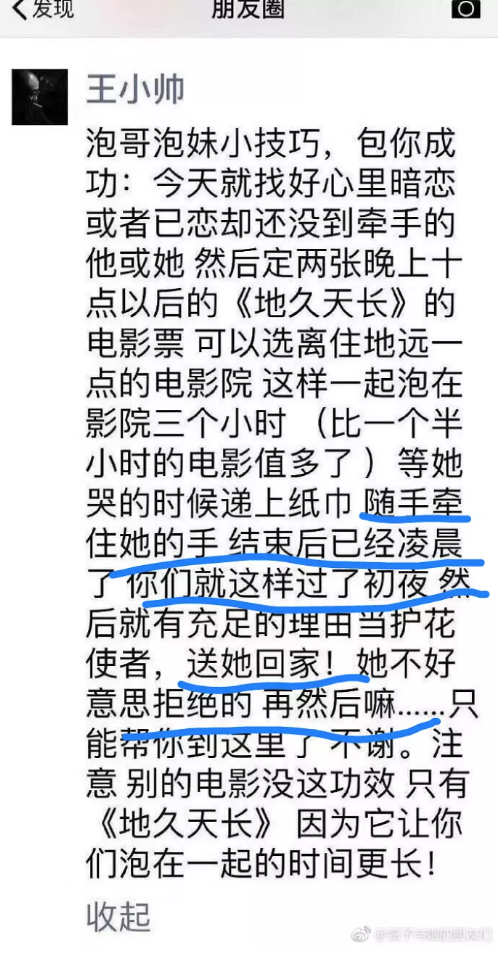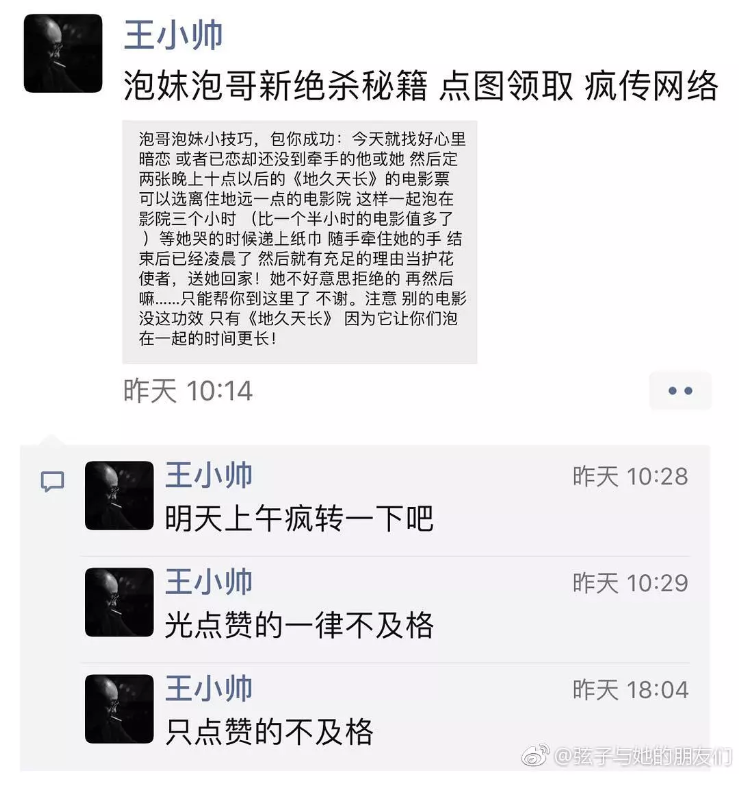Director Wang Xiaoshuai under fire for employing sexist language to promote his new movie
Director Wang Xiaoshuai under fire for employing sexist language to promote his new movie

Chinese director Wáng Xiǎoshuài 王小帅 is taking heat on social media for some remarks he made on WeChat, which were slammed by online critics as “stupid and sexist.”
Currently on a press tour to promote his new movie, So Long, My Son (地久天长 dì jiǔ tiān cháng), Wang shared a string of controversial posts that contain sexist language on his private WeChat account on March 27. Then, someone who found his remarks problematic snapped screenshots and shared them with the wider audience on the internet.
The first questionable post reads:

I am teaching you a dating technique and I guarantee you success. Contact the person you have a crush on or are currently dating. Buy two tickets of So Long, My Son after 11 p.m. in a theater far from where she lives. So you can spend three hours with her (much more worthwhile than an one-hour-and-a-half-long movie). Hand her tissues when she cries so you can hold her hands naturally afterwards. It will be past 12 a.m. when the movie ends, which means you two have spent the first night together. Then you have sound reasons to drive her home because she will feel too awkward to reject you. And then…I can only help you till this point. You’re welcome. Warning that other movies won’t work for you. Only So Long, My Son can because it allows you two to spend longer time together.
Soon after the original post went up, Wang deleted it and replaced it with an almost identical version but without the word “初夜” (chūyè), which often refers to the night when a girl loses her virginity.
Wang then made a third post, which included an image of the second post and a comment saying, “New secret trick of dating. Click to obtain. It’s viral on the internet.”

Below the post, Wang wrote comments asking his WeChat friends to spread the picture as widely as possible. “You won’t get a pass from me by just liking it,” he wrote.
At this point, it seems that Wang’s exclusion of the word “初夜” was a preemptive move to avoid the picture being censored for its explicit sexual implications. But still, the post that Wang hoped would gain traction on the internet was loaded with sexual innuendos. These drew fire from many internet users.
One of the leading critics was Weibo user 弦子与她的朋友们 (xiánzi yǔ tā de péngyǒumen), the woman who is facing a defamation lawsuit filed by famous TV host Zhū Jūn 朱军, whom she accused of sexual assault. In a Weibo post slamming Wang for his offensive language, @弦子与她的朋友们 wrote (in Chinese):
Wang never mentioned how the woman feels in the post. Does she like him? Is she willing to have a sexual relationship with this man? There is no word from the perspective of the woman. What it implies is that men can do whatever they want if they take women to a private space late at night. It’s disrespectful to the woman if the guy really wants to date her. But if the sole purpose is to have sex with her, then Wang is encouraging the man to commit crimes.
Some critics said Wang’s remarks were unsurprising, given his past works, which, as they argue, already spoke a lot to his sexism and misogyny. One Weibo user wrote (in Chinese): “From Beijing Bicycle to So Long, My Son, every woman in Wang’s movies is portrayed as a sexualized object by male protagonists. Wang’s views about women have never changed in such a long time.”
Others have accused critics of overreacting, saying that internet users shouldn’t come after Wang this hard because the director probably didn’t mean to offend women in the first place. In an opinion piece (in Chinese) published by Beijing News, the author acknowledges that the post was a misstep for Wang, but says it was, after all, a “joke that went too far.”
Frankly speaking, it’s unfair to examine Wang’s remarks in the frame of feminist values that are now regarded by many as “politically correct.” There is no need to exaggerate its negative influence and fervently lambaste it.
As a number of internet users discussed a boycott of the movie, Wang took to Weibo to respond to the criticism. “It seems I’m really terrible at promoting,” he wrote, as if he had been slammed for his incompetence at marketing rather than for being a misogynistic director who was trying to sell his work by teaching men how to manipulate women into sex.






